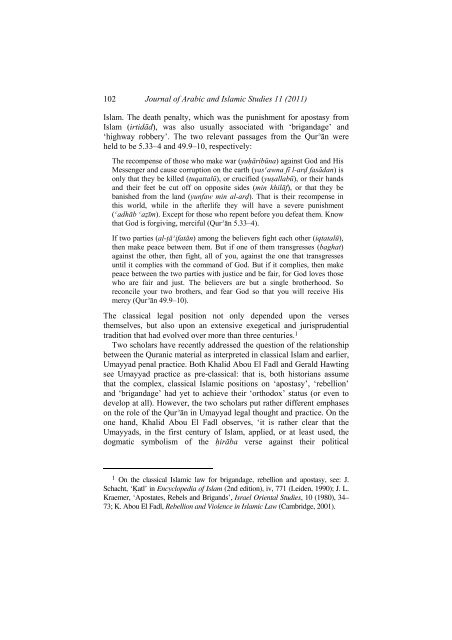JOURNAL OF ARABIC AND ISLAMIC STUDIES
JOURNAL OF ARABIC AND ISLAMIC STUDIES
JOURNAL OF ARABIC AND ISLAMIC STUDIES
You also want an ePaper? Increase the reach of your titles
YUMPU automatically turns print PDFs into web optimized ePapers that Google loves.
102<br />
Journal of Arabic and Islamic Studies 11 (2011)<br />
Islam. The death penalty, which was the punishment for apostasy from<br />
Islam (irtidād), was also usually associated with ‘brigandage’ and<br />
‘highway robbery’. The two relevant passages from the Qurʾān were<br />
held to be 5.33–4 and 49.9–10, respectively:<br />
The recompense of those who make war (yuḥāribūna) against God and His<br />
Messenger and cause corruption on the earth (yasʿawna fī l-arḍ fasādan) is<br />
only that they be killed (tuqattalū), or crucified (yuṣallabū), or their hands<br />
and their feet be cut off on opposite sides (min khilāf), or that they be<br />
banished from the land (yunfaw min al-arḍ). That is their recompense in<br />
this world, while in the afterlife they will have a severe punishment<br />
(ʿadhāb ʿaẓīm). Except for those who repent before you defeat them. Know<br />
that God is forgiving, merciful (Qurʾān 5.33–4).<br />
If two parties (al-ṭāʾifatān) among the believers fight each other (iqtatalū),<br />
then make peace between them. But if one of them transgresses (baghat)<br />
against the other, then fight, all of you, against the one that transgresses<br />
until it complies with the command of God. But if it complies, then make<br />
peace between the two parties with justice and be fair, for God loves those<br />
who are fair and just. The believers are but a single brotherhood. So<br />
reconcile your two brothers, and fear God so that you will receive His<br />
mercy (Qurʾān 49.9–10).<br />
The classical legal position not only depended upon the verses<br />
themselves, but also upon an extensive exegetical and jurisprudential<br />
tradition that had evolved over more than three centuries. 1<br />
Two scholars have recently addressed the question of the relationship<br />
between the Quranic material as interpreted in classical Islam and earlier,<br />
Umayyad penal practice. Both Khalid Abou El Fadl and Gerald Hawting<br />
see Umayyad practice as pre-classical: that is, both historians assume<br />
that the complex, classical Islamic positions on ‘apostasy’, ‘rebellion’<br />
and ‘brigandage’ had yet to achieve their ‘orthodox’ status (or even to<br />
develop at all). However, the two scholars put rather different emphases<br />
on the role of the Qurʾān in Umayyad legal thought and practice. On the<br />
one hand, Khalid Abou El Fadl observes, ‘it is rather clear that the<br />
Umayyads, in the first century of Islam, applied, or at least used, the<br />
dogmatic symbolism of the ḥirāba verse against their political<br />
1 On the classical Islamic law for brigandage, rebellion and apostasy, see: J.<br />
Schacht, ‘Ḳatl’ in Encyclopedia of Islam (2nd edition), iv, 771 (Leiden, 1990); J. L.<br />
Kraemer, ‘Apostates, Rebels and Brigands’, Israel Oriental Studies, 10 (1980), 34–<br />
73; K. Abou El Fadl, Rebellion and Violence in Islamic Law (Cambridge, 2001).

















